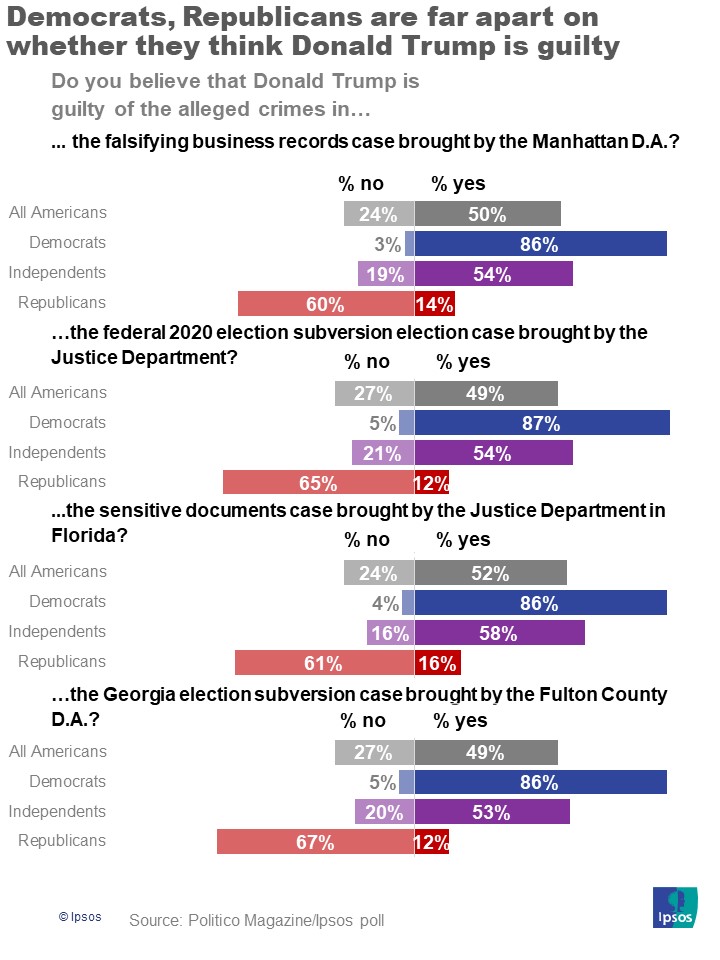Most Americans still think Trump should go to trial before the 2024 Presidential election
Washington DC, March 18, 2024 — Three in five Americans say they think the federal trial on Donald Trump’s 2020 election subversion case should take place before the presidential election in November, levels that have held steady since August 2023, according to a new Politico Magazine/Ipsos poll. The poll also finds that a plurality of Americans believes that Trump, if convicted, should face imprisonment over just probation, a financial penalty, or no penalty whatsoever.
The poll also finds that Americans’ opinions on several of the indictments Trump is facing, including the federal 2020 election subversion case, the sensitive document case, the falsifying business records case, and the Georgia 2020 election subversion case, are highly divided by political identity. That said, the poll finds that over half of Americans believe Trump is guilty in at least one of the four indictments tested, levels that also vary widely across party lines.
Detailed findings
- Most Americans say they are familiar with Trump’s various legal troubles.
- Seven in ten Americans (69%) say they are familiar with the various investigations, indictments, and trials that Trump is facing.
- Roughly two in three Americans say they understand the details in the legal matters facing Donald Trump, including the federal 2020 election subversion case (64%), the sensitive document case (64%), the falsifying business records case (61%), and the Georgia 2020 election subversion case (61%).
- Democrats are more likely to say they are familiar with these cases (74%, 74%, 73%, and 75% familiar, respectively) than Republicans (63%, 63%, 59%, and 59%).
- These levels are mostly unchanged since August 2023.
- Americans are split by partisanship when it comes to believing Trump is guilty of the alleged crimes.
- Roughly half of the respondents believe Trump is guilty of the alleged crimes in the sensitive documents case (52%), falsifying business records case (50%), federal 2020 election subversion case (49%), and Georgia election subversion case (49%). These levels have held steady since August 2023.

- Belief that Trump is guilty is split by party. While a majority of Democrats say they believe Trump is guilty in all four cases (86%, 86%, 87%, and 86%, respectively), few Republicans think the same (16%, 14%, 12%, and 12%). A majority of independents believe Trump is guilty in the four cases (58%, 54%, 54%, and 53%).
- A majority of Americans (56%) think Trump is guilty in at least one of the cases included in the poll. Just under half believe he is guilty in in all four cases (44%), while 20% believes he is guilty in none of the four tested cases.
- Democrats are the most likely to think Trump is guilty in all four cases (82%), while around half of Republicans think Trump is not guilty in any of the four cases (53%).
- Roughly half of the respondents believe Trump is guilty of the alleged crimes in the sensitive documents case (52%), falsifying business records case (50%), federal 2020 election subversion case (49%), and Georgia election subversion case (49%). These levels have held steady since August 2023.
- Most Americans think the federal 2020 election subversion case should head to trial before the presidential election in November 2024.
- Three in five Americans think the federal trial on Donald Trump’s 2020 election subversion case should take place before the 2024 presidential election in November 2024 (59%). Nearly all Democrats agree with this (90%), while 26% of Republicans and 65% of independents agree.
- This is roughly in line with Politico Magazine/Ipsos polling conducted in August 2023, where 61% said they think Trump’s trial on this case should take place before the election.
- If Donald Trump is eventually convicted in the federal 2020 election subversion case, a plurality of Americans (49%) think he should be imprisoned. One in five think he should receive no penalty (21%), 16% think he should receive probation, but no imprisonment, and 10% think he should receive a financial penalty only. Republicans are far less likely to think Trump should be imprisoned (12%) and more likely to think he should receive no penalty (49%) if he is convicted. Democrats, on the other hand, favor imprisonment (81%).
- Two in five Americans say a conviction would affect their likelihood to support Trump.
- A plurality of Americans say a Trump conviction in the Justice Department’s 2020 election subversion case (42%) and the Manhattan D.A.’s falsifying business records case (44%) would have no impact on their likelihood to support him for president.
- Americans are more likely to say a conviction in either the Justice Department’s 2020 election subversion case or the Manhattan D.A.’s falsifying business records case would make them less likely to support Trump (32% for both) than make them more likely to support Trump (12% and 13%, respectively).
- One in three Republicans say a conviction in either the election subversion case (29%) or the falsifying business records case (34%) would make them more likely to support Trump.
- Most Americans say they don’t think presidents should be immune from criminal prosecution for alleged crimes that took place while they were in office.
- A majority of Americans (70%) say they don’t believe U.S. presidents should be immune from criminal prosecution for alleged crimes that occurred while in office. These levels are higher among Democrats (92%) and independents (75%) compared to Republicans (48%).
- One in four Republicans (24%) say they think U.S. presidents should be immune from alleged crimes that occurred while in office, compared to just 3% of Democrats and 8% of independents.
- Just one in four (24%) trusts the Supreme Court to issue a fair and non-partisan ruling on the question of if Donald Trump is immune from prosecution for actions related to the 2020 election and January 6 events. Just under half (46%) say they don’t trust the Supreme Court to issue a fair and non-partisan ruling, while 29% are unsure. Republicans (38%) are more likely to trust the Supreme Court here than Democrats (14%) or independents (24%).
- When it comes to Michael Cohen’s testimony against Donald Trump, half of Americans say they think it will be honest (47%), while the other half thinks it will not be honest (48%). Republicans and Democrats are split here – 74% of Democrats think the testimony will be honest, while 79% of Republicans thinks it will not be honest.
About the Study
This Politico Magazine/Ipsos poll was conducted March 8-10, 2024, by Ipsos using the probability-based KnowledgePanel®. This poll is based on a nationally representative probability sample of 1,024 general population adults age 18 or older.
The margin of sampling error is plus or minus 3.3 percentage points for at the 95% confidence level, for results based on the entire sample of adults. The margin of sampling error takes into account the design effect, which was 1.19 for all respondents. The margin of sampling error for this study is plus or minus 6.2 percentage points at the 95% confidence level, for results based on the sample of Republican adults. The margin of sampling error takes into account the design effect, which was 1.13 for all Republican respondents. The margin of sampling error for this study is plus or minus 5.9 percentage points at the 95% confidence level, for results based on the sample of Democratic adults. The margin of sampling error takes into account the design effect, which was 1.16 for all Democratic respondents. The margin of sampling error for this study is plus or minus 5.8 percentage points at the 95% confidence level, for results based on the sample of independent adults. The margin of sampling error takes into account the design effect, which was 1.13 for all independent respondents.
In our reporting of the findings, percentage points are rounded off to the nearest whole number. As a result, percentages in a given table column may total slightly higher or lower than 100%. In questions that permit multiple responses, columns may total substantially more than 100%, depending on the number of different responses offered by each respondent.
The survey was conducted using KnowledgePanel, the largest and most well-established online probability-based panel that is representative of the adult U.S. population. Our recruitment process employs a scientifically developed addressed-based sampling methodology using the latest Delivery Sequence File of the USPS – a database with full coverage of all delivery points in the U.S. Households invited to join the panel are randomly selected from all available households in the U.S. Persons in the sampled households are invited to join and participate in the panel. Those selected who do not already have internet access are provided a tablet and internet connection at no cost to the panel member. Those who join the panel and who are selected to participate in a survey are sent a unique password-protected log-in used to complete surveys online. As a result of our recruitment and sampling methodologies, samples from KnowledgePanel cover all households regardless of their phone or internet status and findings can be reported with a margin of sampling error and projected to the general population. KnowledgePanel members receive a per survey incentive, usually the equivalent of $1 (though for some it is $2) in points, that can be redeemed for cash or prizes. No prenotification email for this study was sent prior to field. Panelists receive a unique login to the survey and are only able to complete it one time. One reminder email was sent for this study.
The data for the total sample were weighted to adjust for gender by age, race/ethnicity, education, Census region, metropolitan status, and household income. The demographic benchmarks came from the 2023 March Supplement of the Current Population Survey (CPS). The weighting categories were as follows:
- Gender (Male, Female) by Age (18–29, 30–44, 45-59 and 60+)
- Race/Hispanic Ethnicity (White Non-Hispanic, Black Non-Hispanic, Other, Non-Hispanic, Hispanic, 2+ Races, Non-Hispanic)
- Education (Less than High School, High School, Some College, Bachelor or higher)
- Census Region (Northeast, Midwest, South, West)
- Metropolitan status (Metro, non-Metro)
- Household Income (Under $25,000, $25,000-$49,999, $50,000-$74,999, $75,000-$99,999, $100,000-$149,999, $150,000+)
- Party ID (Democrat, Republican, Independent, Something else)
This topline is trended with data from a previous Politico Magazine/Ipsos poll fielded August 18-21, 2023, using the probability-based KnowledgePanel®. This poll is based on a nationally representative probability sample of 1,032 general population adults age 18 or older. The margin of sampling error is plus or minus 3.2 percentage points for at the 95% confidence level, for results based on the entire sample of adults. The margin of sampling error takes into account the design effect, which was 1.08 for all respondents. More information about this poll can be found here.
For more information on this news release, please contact:
Chris Jackson
Senior Vice President, US Public Affairs
+1 202 420-2025
About Ipsos
Ipsos is one of the largest market research and polling companies globally, operating in 90 markets and employing over 18,000 people.
Our passionately curious research professionals, analysts and scientists have built unique multi-specialist capabilities that provide true understanding and powerful insights into the actions, opinions and motivations of citizens, consumers, patients, customers or employees. Our 75 solutions are based on primary data from our surveys, social media monitoring, and qualitative or observational techniques.
Our tagline "Game Changers" sums up our ambition to help our 5,000 customers move confidently through a rapidly changing world.
Founded in France in 1975, Ipsos has been listed on the Euronext Paris since July 1, 1999. The company is part of the SBF 120 and Mid-60 indices and is eligible for the Deferred Settlement Service (SRD).
ISIN code FR0000073298, Reuters ISOS.PA, Bloomberg IPS:FP www.ipsos.com



